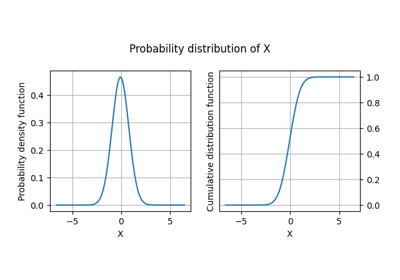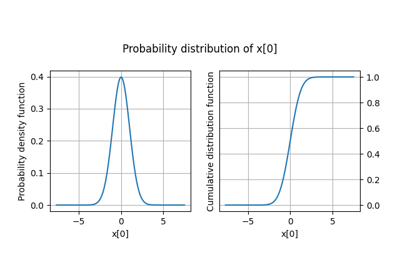distribution module¶
The interface to OpenTURNS-based probability distributions.
The OTDistribution class is a concrete class
inheriting from BaseDistribution which is an abstract one.
OT stands for OpenTURNS
which is the library it relies on.
The OTDistribution of a given uncertain variable is built
from mandatory arguments:
a variable name,
a probability distribution name recognized by OpenTURNS,
a set of parameters provided as a tuple of positional arguments filled in the order specified by the OpenTURNS constructor of this probability distribution.
Warning
The probability distribution parameters must be provided according to the signature of the openTURNS classes. Access the openTURNS documentation.
The constructor has also optional arguments:
a variable dimension (default: 1),
a standard representation of these parameters (default: use the parameters provided in the tuple),
a transformation of the variable (default: no transformation),
lower and upper bounds for truncation (default: no truncation),
a threshold for the OpenTURNS truncation tool (more details).
- class gemseo.uncertainty.distributions.openturns.distribution.OTDistribution(variable='x', interfaced_distribution='Uniform', parameters=(), dimension=1, standard_parameters=None, transformation=None, lower_bound=None, upper_bound=None, threshold=0.5)[source]
Bases:
BaseDistributionAn OpenTURNS-based probability distribution.
Create a probability distribution for an uncertain variable from its dimension and probability distribution name and properties.
Examples
>>> from gemseo.uncertainty.distributions.openturns.distribution import ( ... OTDistribution, ... ) >>> distribution = OTDistribution("x", "Exponential", (3, 2)) >>> print(distribution) Exponential(3, 2)
- Parameters:
variable (str) –
The name of the random variable.
By default it is set to “x”.
interfaced_distribution (str) –
The name of the probability distribution, typically the name of a class wrapped from an external library, such as
"Normal"for OpenTURNS or"norm"for SciPy.By default it is set to “Uniform”.
parameters (tuple[Any]) –
The parameters of the probability distribution.
By default it is set to ().
dimension (int) –
The dimension of the random variable. If greater than 1, the probability distribution is applied to all components of the random variable under the hypothesis that these components are stochastically independent. To be removed in a future version; use a
BaseJointDistributioninstead.By default it is set to 1.
standard_parameters (StandardParametersType | None) – The parameters of the probability distribution used for string representation only (use
parametersfor computation). IfNone, useparametersinstead. For instance, let us consider the interfaced OpenTURNS distribution"Dirac". Then, the string representation ofOTDistribution("x", "Dirac", (1,), 1, {"loc": 1})is"Dirac(loc=1)"while the string representation ofOTDistribution("x", "Dirac", (1,))is"Dirac(1)".transformation (str | None) – A transformation applied to the random variable, e.g. \(\sin(x)\). If
None, no transformation.lower_bound (float | None) – A lower bound to truncate the probability distribution. If
None, no lower truncation.upper_bound (float | None) – An upper bound to truncate the probability distribution. If
None, no upper truncation.threshold (float) –
A threshold in [0,1].
By default it is set to 0.5.
- JOINT_DISTRIBUTION_CLASS
alias of
OTJointDistribution
- compute_cdf(vector)[source]
Evaluate the cumulative density function (CDF).
Evaluate the CDF of the components of the random variable for a given realization of this random variable.
- Parameters:
vector (Iterable[float]) – A realization of the random variable.
- Returns:
The CDF values of the components of the random variable.
- Return type:
ndarray
- compute_inverse_cdf(vector)[source]
Evaluate the inverse of the cumulative density function (ICDF).
- Parameters:
vector (Iterable[float]) – A vector of values comprised between 0 and 1 whose length is equal to the dimension of the random variable.
- Returns:
The ICDF values of the components of the random variable.
- Return type:
ndarray
- compute_samples(n_samples=1)[source]
Sample the random variable.
- dimension: int
The number of dimensions of the random variable.
- distribution: ot.ComposedDistribution
The probability distribution of the random variable.
- distribution_name: str
The name of the probability distribution.
- marginals: list[ot.Distribution]
The marginal distributions of the components of the random variable.
- math_lower_bound: ndarray
The mathematical lower bound of the random variable.
- math_upper_bound: ndarray
The mathematical upper bound of the random variable.
- property mean: ndarray
The analytical mean of the random variable.
- num_lower_bound: ndarray
The numerical lower bound of the random variable.
- num_upper_bound: ndarray
The numerical upper bound of the random variable.
- property standard_deviation: ndarray
The analytical standard deviation of the random variable.
- standard_parameters: dict[str, str] | None
The standard representation of the parameters of the distribution, used for its string representation.
- transformation: str
The transformation applied to the random variable, e.g. ‘sin(x)’.
- variable_name: str
The name of the random variable.
Examples using OTDistribution¶

Fitting a distribution from data based on OpenTURNS

